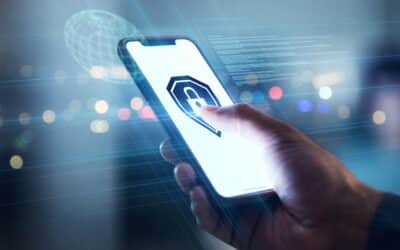Experts in the financial industry are expecting scammers to use new technology, such as artificial intelligence (AI), to play on emotions in attempts to trick and scare people. Regardless of the method being used, scammers usually have the same goal — to obtain your personal information and/or money. Learning about the latest developments with AI will help you stay one step ahead so you can protect yourself, your business and your loved ones from AI scammers.
What Is Artificial Intelligence?
Artificial intelligence is technology that enables computers and machines to simulate humans. Just like humans, AI can learn from experiences and make decisions. It uses data and patterns to solve problems and perform tasks. It’s a technology that allows us to make machines smarter so they can assist us in various jobs. While AI can be used in many positive ways, scammers have found ways to exploit AI.
What Does an AI Scam Look Like?
Scams using AI can take many different forms, including AI voice cloning scams, deepfake video or image scams, live video impersonations to be used for AI call scams, AI-enhanced phishing emails or even AI-generated websites and listings.
For AI voice cloning, scammers use AI software that is widely available online to create a convincing copy of your voice to make it say anything they want. When on the phone with a scammer, they find a way to engage whoever answers the phone so that you share details and validate personal information, which helps with voice cloning. Once the scammer has audio of your voice saying a few words, AI can learn how you sound—your tone, pitch and the way you say words. After it collects those details, the computer can create new sentences in your voice, even if you have never said those exact words before. Pairing that with the personal information obtained from their phone call with you, the scammer can call in to your financial institution(s) and impersonate you with the AI-generated audio.
No matter the type of artificial intelligence scam, AI fraud helps scammers gain control faster and more efficiently with the end goal of stealing your information, assets and identities.
How to Identify AI Scams
By inventing an emotional situation, scammers trick their victims into cooperating with their demands before they realize they’re being deceived. As scammers build on traditional methods with newer AI capabilities, their schemes only stand to become more dangerous and difficult to identify. Here’s what red flags to look for to help you figure out if something is an AI scam.
Links to a Chatbot
If you find yourself talking to a chatbot after clicking a link in an email or text, you might be in the midst of an AI scam.
Asking for Irrelevant Personal Information
An AI scam bot might ask you for personal information that isn’t necessary or relevant to the exchange.
Extreme Situations with a Sense of Urgency
AI voice cloning scams can make targets think their loved ones are in serious trouble, which creates a sense of urgency. Although these situations can be nerve-wracking, try to stay calm and remember that these scams exist.
Odd Imagery
Some scams use AI-generated images as advertisements that compel viewers to purchase a fake product or donate to a phony cause. AI-generated images aren’t perfect, so look closely at the details.
How to Avoid AI Scams
Below are ways to minimize your risk for AI scams.
Be Smart on Social Media
Don’t post about upcoming trips on social media. If scammers know you’re going to be away, they may take the opportunity to target your parents, grandparents or other loved ones while you’re harder to reach.
Protect Your Personal Information
Only share personal information with people you can trust. Even basic information can be used against you when it falls into the wrong hands. Don’t give out your email address, phone number, login information or any other personal details unless you fully trust the other person.
Ignore Unknown Callers
Do not engage with unknown numbers. Allow the call to go to voicemail, giving you time to confirm the number or what the call is about. If you receive a text message from an unknown number, do not respond. If a company name is provided in the text message, you can search the company online to see if there is a phone number you can contact to confirm the text message notification.
Click Trusted Links
Do not click on unsolicited links in emails, text messages or direct messages on social media.
What to Do If You’re a Victim of an AI Scam
- Hang up right away and stop engaging.
- Report the scam to authorities by contacting local law enforcement, regulatory agencies, your financial institution and the FTC, SEC and IC3.
- If you believe that your personal information has been compromised, you can also report identity theft.
- Review the list of recovery steps on IdentityTheft.gov.
- Check out the Centris Federal Credit Union Cybersecurity Center for tips on how to protect your personal information from identity theft and fraud going forward.
How Centris Federal Credit Union Helps Protect You from AI Scams
We make it a priority to keep a pulse on the latest scams and fraudulent trends. As technology continues to evolve and improve, scammers will find ways to exploit advancements.
Always use caution when receiving unexpected calls from your financial institution, especially if personal information is being requested. Use caution with unsolicited or questionable emails or text messages that contain a link. If you are ever unsure if a phone call, text message or email is legitimate, please reach out to us. As your trusted financial partner, we are happy to take a look at it for you.




